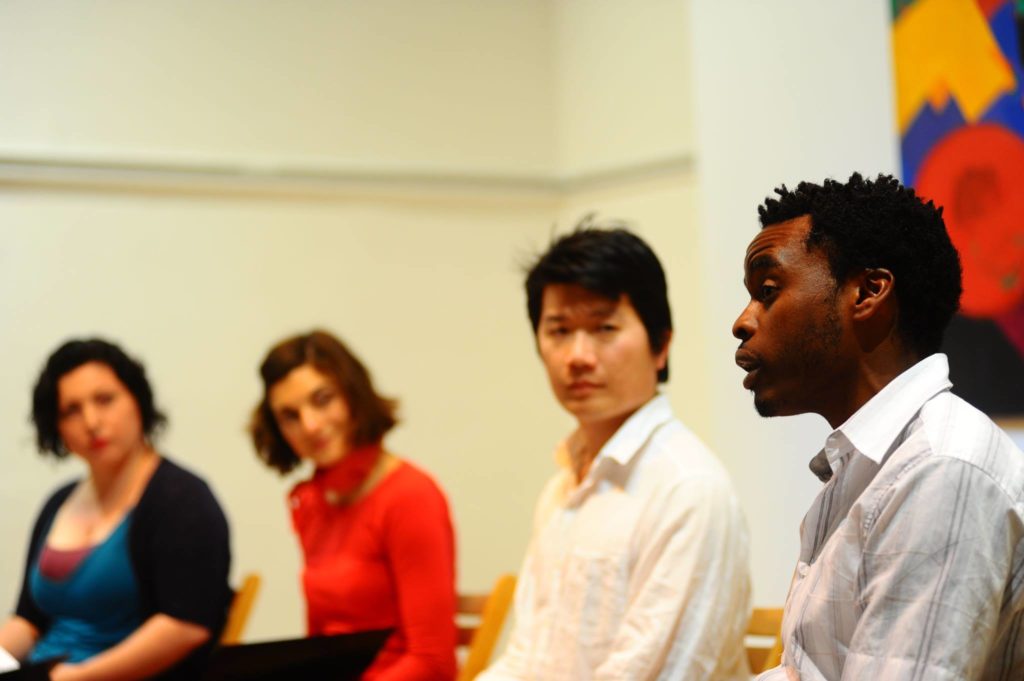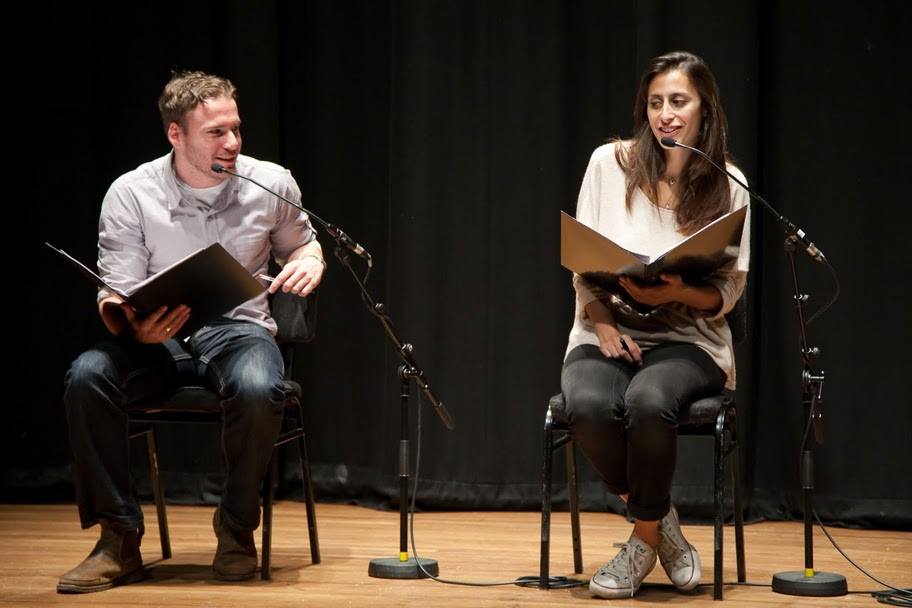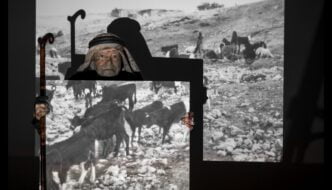Review: Ice & Fire’s Asylum Monologues @ Oldham Library
July 3, 2016

Photo Credit: Ice and Fire
It seems as clear as the colour of the sky (grey in Little England, blue elsewhere) to note the two main themes that have rippled through the lion’s share of news since last year: the mass displacement of people into Europe from countries ravaged in the Arab Spring’s aftermath, and a global swing to the right in governments from Hungary and Brazil to the U.S, which must soon pick its poison between a convinctionless experiment in clickbait gone horribly wrong and a convinctionless hawk whose pulse quickens only in response to dollar signs and detonations.
Perhaps less obvious is that these movements have brought with them what I’ll informally call the new ‘most powerful words in the English language’. Unlike previous title holders, these words are perfectly acceptable before the watershed, though may be heard with similar frequency in earshot of your local pub. The first, racist, now doubles as a damning silencer for the digital electorate – apparently it is more progressive to pre-emptively shun someone as a racist than to engage with criticism of Islam or the European Union – though such uses of the term are still much less offensive than any racial discrimination it calls out, which brings me to the second word: immigrant. If you read the right sort of logic-defying rag, an immigrant is the sinister alien that refuses to phone home all to simultaneously steal both your benefits AND your jobs, and not because there is no one to answer among the ruins. Asylum seeker, though less catchy a phrase, at least gifts immigrants with a just motive.
“You can’t leave the people you love and come to a land where you know no one without a strong enough reason” says Julie to that effect, one of three asylum seekers whose testimony is performed in Ice & Fire’s ‘Asylum Monologues’. One of the ways in which Ice & Fire succeed in humanising their represented asylum seekers is by how little is done to dramatise their stories; there is no elaborate staging in Oldham Library, as we see only the three local actors giving clear and emphatic readings of their testimonies back and forth.
A nuance to ‘Asylum Monologues’ is the picture it paints of the asylum seekers’ past lives. The path Rose (Heather Carroll) takes to the UK is prefaced by danger from the very start – she is a Zimbabwe native who moved to Nigeria as a child through an arranged marriage to a 58 year old man, before being whisked away by a loaner to earn abroad. More surprising, though, are the two relatively middle class lives snatched away. Julie (Rhianne Starbuck) was a representative for domestic and child welfare in Uganda with a husband in the opposition’s army before she was detained for her activism by the Ugandan government, adrift from her family and raped by thirty men in a ‘safe house’ – a cruel euphemism if there ever was one – before her escape to England. Meanwhile, Sayid (Phil Dennison) enjoyed a career as a lawyer in a firm owned by a relative of Bashar al-Assad. Most tragic is Sayid’s description of the 2011 protests in Damascus as ‘hopeful and exciting’ in reference to Tunisia’s democratic reform – the sole success story of the Arab Spring – and Assad’s promises of free speech, unknown to him yet that his children will later write that they are no longer scared of rockets, bombing and kidnapping, for they are ‘used to it’.
However, the most original angle that ‘Asylum Monologues’ offers to our consideration of asylum seekers is that strife does not evolve into hand-outs upon reaching foreign shores. In the hands of the Home Office, it instead evolves into what Julie describes as a ‘diplomatic form of torture’. Arriving at Heathrow malnourished and pregnant with a child of rape, the Home Office denied Julie asylum on the grounds that she was just a ‘low-key activist’ and later overturned a judge’s decision to grant asylum. When submitting another appeal, Julie’s lawyer advised her that the sluggish bureaucracy of the Home Office may take years to return a decision, the lack of stability from settler’s rights leaving her in limbo, or, as she puts it, ‘they are not raping us, they are not burning us with cigarettes, they are not hitting us with guns but they are torturing us mentally’.

Photo Credit: Ice and Fire
Last year, Home Secretary Theresa May claimed that ‘when immigration is too high, it’s impossible to build a cohesive society’. However, it is the protocol of her very department that engineers social exclusion for asylum seekers already in the country. After suffering heavy physical frisking and rape during her detainment at the airport, Rose set about finding other black people ‘to hide with’. Disenfranchised from any employment, benefit or housing access, she integrated with a community of Pakistani and Niger immigrants in Peckham, receiving £50 per week for a cleaning job before getting a 10 month prison sentence for illegal work.
Prison, sadly, is the most merciful phase of Rose’s story, as the ‘friendliness’ she enjoyed in jail evaporates under the detention of the Home Office. ‘In prison, you count down; in detainment, you count up’ is a chilling summary of the time Rose and surely many other asylum seekers have spent in detainment, as the UK is one of a few European countries that has no time limit on detention. Working for £5 per week in the kitchens at Yarl’s Wood detention centre – notorious for human rights violations – the Home Office refused her release. Eventually released and supported only by supermarket vouchers – snacks and frozen food being her only sustenance – her appeal that this was an unlawful detention, despite medical reports of rape, scars and loss of teeth, was again discredited as a lie. Rose’s request to be considered for deportation back to her native Zimbabwe rather than Nigeria was met by the Home Office bringing her to the Nigerian High Commission seven times by 2012, on the grounds that she ‘speaks the language’.
In 2014, an investigation into Yarl’s Wood Detention Centre by Rashida Manjoo – the UN’s Special Rapporteur on Violence Against Women – was blocked by the Home Office; a permanent black mark on any moral authority Theresa May claims in her bid for party leadership and an obstruction of justice I can only hope does not repeat itself next year, when the UN is set to publish its investigation of Iain Duncan-Smith’s Department of Work and Pensions.
Whilst ‘Asylum Monologues’ does end with a ray of hope – Julie was finally granted indefinite leave from Uganda with settlement rights, and her daughter brought over to the UK – I asked the Ice & Fire team what their current prognosis of the Home Office’s handling of asylum seekers was, based on the charity’s ongoing contact with refugees. The response I got was that the Home Office was ‘increasingly capricious’ to deal with, a trend that shows no signs of slowing down.
Harrowing as it may be, Ice & Fire’s Asylum Monologues dignifies asylum seekers with the humanity that sensationalist media has stolen from them and destroys the myth that the immigrant’s life is a free ride past border control; as if there ever were detention centres made of gold, or food stamps for milk and honey.
Ice & Fire is a registered charity (1118200) dedicated to exploring human rights issues through performance. For more information on the charity’s work, please visit their website. Those interested in booking a performance can do so here.
Filed under: Politics, Theatre & Dance, Written & Spoken Word
Tagged with: activism, Asylum Monologues, asylum seekers, human rights, Ice and Fire, immigration, monologue, refugees, yarl's wood detention centre



Comments